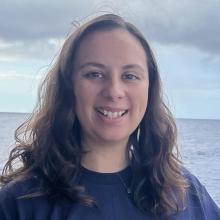
Emily Young
Tell us about your work/research. What kinds of things do you do?
This year (2023), I am working at the Bureau of Ocean Energy Management (BOEM) as a Knauss Marine Policy Fellow. The John A. Knauss Marine Policy Fellowship, offered by Sea Grant, gives graduate students and recent graduates the opportunity to spend one year working in U.S government positions related to marine and coastal policy. My placement is with the Bureau of Ocean Energy Management - the agency responsible for managing offshore energy and resource development, while ensuring environmental stewardship. The role of my fellowship year is to enhance the climate literacy of the BOEM workforce. Climate change intersects marine policy and BOEM's work in many ways. I'm focused on identifying the climate-related needs, resources, and trainings for BOEM and Department of Interior staff. All the while, I am learning about how science is managed and incorporated into decision-making throughout BOEM's Office of Environmental Programs, as well as broadly across the Federal Government.
What sparked your initial interest in your career?
I grew up on the Isle of Wight, a small island in southern England with stunning coastlines and tidepools full of critters. I always gravitated towards science and math subjects at school, and that led me towards an undergraduate degree in Marine Biology. A deep-sea biology class left me captivated by deep-sea environments and inspired me to pursue a PhD in deep-sea biology. My PhD research, focused on the habitats formed around sunken whale carcasses and wood, was heavily ecology oriented, and I wanted to diversify my skills towards the marine policy field, which is why I applied to the Knauss Marine Policy Fellowship program.
Who influenced you or encouraged you the most?
My family, and especially my dad, have always been supportive of my interests in science and marine biology. Even when I wanted to move ~7000 miles from the UK to Hawaiʻi for grad school!
What element of your work/study do you think is the most fascinating?
The fact that sunken whale carcasses can support many thousands of animals, of hundreds of species, and for up to a hundred years still fascinates me!
How did you get involved with the Ocean Exploration Trust?
Knauss fellows are encouraged to engage in a diverse array of opportunities throughout their fellowship year. I was invited to participate in the NA157 expedition after word got around of my background in deep-sea ecology, my experience with previous research cruises, and my connections to Hawaiʻi. In addition to contributing to the scientific mission, I will be sharing insights into my journey as an early-career marine scientist as well as my experience with the Knauss marine policy fellowship program.
What other jobs led you to your current career?
I applied to the Knauss marine policy fellowship program as a means to connect my academic background with the world of marine policy, and various facets of my graduate school journey are relevant to my present fellowship role. I developed my expertise in deep-sea ecology and oceanography during research conducted during my graduate studies, throughout my doctoral work as well as additional side projects. My deep-sea expertise is a natural fit with BOEM's focus on deeper offshore environments. Additionally, I taught introductory oceanography courses for numerous semesters during graduate school, which involved me instructing and facilitating discussions on climate change. This experience reinforced my commitment to addressing climate change in my career and gave me experience supporting the climate-literacy of others. Lastly, my ongoing involvement in science communication and public outreach activities has finely tuned my adaptable communication skills, a crucial asset for effective work in federal government and beyond.
What are your degrees and certifications?
Doctor of Philosophy in Biological Oceanography -- University of Hawaiʻi at Mānoa 2023; Master of Science (Integrated) in Marine Biology -- University of Southampton 2014
What are your hobbies?
I enjoy fossil hunting, rock climbing, and singing!
What advice would you give someone who wants to have a career like yours?
To those finding their path within marine science, focus on finding the topics that captivate you (e.g., deep-sea, fisheries, climate change) while also discovering the skills and types of work that you enjoy and excel at (e.g., writing, programming, lab work, field work). Engage with the diverse community of marine scientists and engineers you encounter, and you'll soon realize the vast array of career opportunities within our field, enabling you to shape a path that perfectly aligns with your strengths and aspirations.
And to those nearing the end of their graduate degrees, I highly encourage you to consider a policy-related fellowship! Even if your ultimate goal is an academic career, policy experience can enhance your journey, for example by deepening your understanding of conducting impactful research, learning how to craft successful grant proposals, and diversifying your communication skills. If you've determined that academia isn't your chosen path, a fellowship can equip you with versatile skills to break into various marine policy fields where the expertise of marine scientists is in high demand.
Expeditions
Emily participated in the following Ocean Exploration Trust expeditions:
